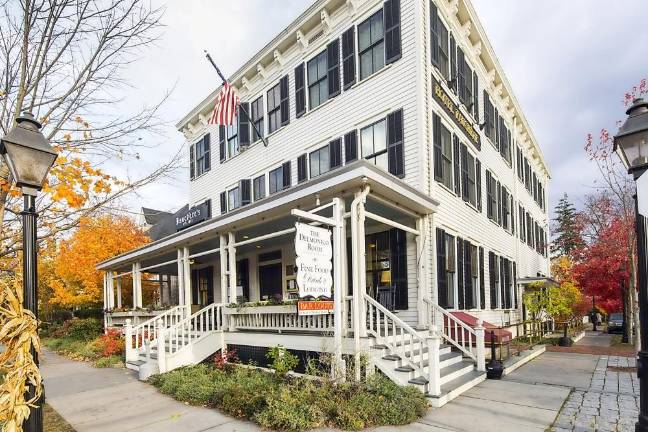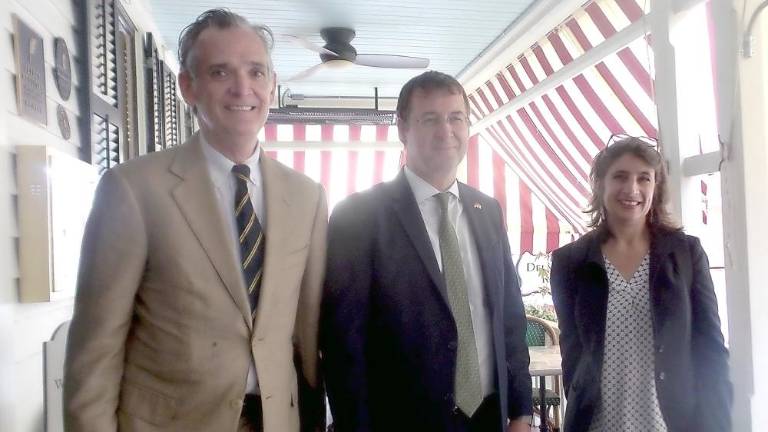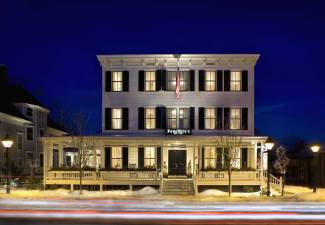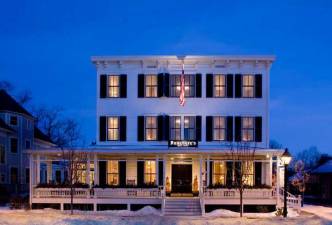The end of an era: Sean Strub sells the Hotel Fauchère
Milford. Strub reflects on his years restoring the historic building, turning it into a cultural center for the community, and parting ways with an institution that had over the past two decades become entwined with his persona.


Before Milford Mayor Sean Strub sold the Hotel Fauchère and 403 Broad to Bill Rosado’s Milford Hospitality Group, people were buzzing about it for months.
The sale closed on Sept. 17 and was announced by the Milford Hospitality Group, which is described as, “a premier operator of first class hotels and restaurants located in Milford, PA.” The group recently restored the Tom Quick Inn and own several other restaurants in town.
It is the end of an era of Strub’s stewardship and his very close association with the hotel. Indeed, the Fauchère had taken on his persona.
The hotel was founded in 1852 by Louis Fauchère and was operated after his death by his descendants until 1976, when it started to fall into total disrepair. In 2001, Dick Snyder and Sean Strub bought the hotel and spent millions restoring it as a luxury destination. It became a mecca for high-profile guests and their talks, cultural presentations, famous authors, innovative special dinners (like the Ojibwe Indian feast), and national and international political leaders. When Snyder died suddenly in 2014, Strub became the owner.
The Courier reached out to Strub to get a more personal view of his feelings about selling this grand old hotel.
Q. Since talking full ownership of the Fauchère in 2014, when did you actually decide that you wanted to sell it?
A. It was never my intention to be a restaurateur or hotelier. I was an investor in the project from the beginning, but never intended to manage it. I describe myself as a building restorer/preservationist who got carried away! Dick oversaw the daily operations of the business and when he died, it was likely to close, which would have been terrible for Milford. So I bought out his interest and sought to stabilize the business until we could find an appropriate buyer.
Q. Was the idea of selling it to Bill Rosado influenced by his heavy investment in Milford, in buying several other restaurants and the theater?
A. I’ve known Bill for about 15 years and we’ve always been friendly. He has supported many community endeavors in which I’ve been involved, including Greater Pike Community Foundation, Black Bear Film Festival, and others. He has always been interested in the success of Milford and he’s understood the importance of having a vibrant commercial district. He was considering buying the Tom Quick for at least ten years before he finally did so. I am glad we found a buyer who is local, clearly committed to the success of Milford, and with a track record of community and philanthropic engagement.
Q. You were the Fauchère, and it was you, with events reflecting your personal and sometimes political views, as well as your position as mayor. Will the image of the Fauchère will be different because you are not there?
A. Legendary hospitality establishments frequently become intertwined with the identity and personality of an owner or manager and that has always been the case with the Fauchère, from when Louis Fauchère ran it, his daughter Marie Fauchère Tissot, his grandson Warren Chol Sr., and in the ‘70s with his descendants Lou and Michelle Chol and Warren Chol, or even key members of the staff, like Chef Cesar Ciappini.
The Milford Hospitality Group includes key personnel who are well-known, admired, and respected in our community, including staff they’ve “inherited” at the Fauchère here. For the hotel to be successful it will require a high level of personal attention to the guests, and I am confident that will continue. I’ve already had regular guests at the hotel let me know when they are visiting so we can have a drink or at least say hello. That’s one of the most enjoyable aspects of the business, is getting to know so many great guests and being able to share Milford and Pike County with them.
Q. Where will innovative ideas be nurtured without the Fauchère? I’m thinking of the many events that started there, such as the founding of the Milford Readers and Writers Festival.
A. The Fauchère was the center for many community initiatives and efforts long before Dick and I reopened it, and I am sure it will be for many decades into the future. Just last week they hosted a luncheon I organized for a number of civic leaders to meet with the new acting director at Grey Towers. This week, at my invitation, the German Consul General is hosting a luncheon at the Fauchère to meet with business and economic development leaders in northeast Pennsylvania. If anything, becoming part of the Milford Hospitality Group will enhance its ability to serve in this role.
Q. What was the staff’s reaction when the deal was done?
A. Mixed, just as Xavier (Strub’s husband), my sister, and I have had mixed reactions about stepping back. But they (the staff) also are enthusiastic about having more resources to better enable them to do their jobs, the opportunity for career advancement within a larger hospitality parent company, and some of our senior staff are good friends with some of the senior staff at the Milford Hospitality Group. We were thrilled when the Tom Quick reopened. I can’t say there weren’t a few tears in the last few days before the sale, because there were, but every successful hospitality enterprise has an aspect to it that is like a family. We care a lot about each other.
Q. What are your own feelings now that the Fauchère is now longer a part of your identity?
A. I don’t think of it that way. I was proud of the Fauchère when I owned it and remain proud of it and committed to its success. Reopening the Fauchère was a key milestone in the Milford renaissance over the past 25 years. It inspired other investment in Milford’s historic district, introduced many to the magic and beauty of our region and has played an important role in supporting the arts, our commercial district, enhancement of our local culinary scene and has been a source of pride to the entire community. This is just the next chapter, and I’m happy to have it as a part of my identity and to serve as mayor of the community where the Hotel Fauchère is such an important feature.
Q. What are your plans for the near future?
A. I have a lot going on, between serving as mayor — and running for reelection — my writing, advocacy and real estate work. Selling the hotel doesn’t give me any more time. We all only have 24 hours in a day, but it does relieve a lot of stress. Those calls in the middle of the night when a guest was locked out, or a late check-in, or the fire alarm went off, or someone needs ice, will not be missed in my household!
Q. What is your parting message to all of the patrons and staff who have come to know and love the Fauchère?
A. All Dick and I wanted to do was restore the Fauchère to its central place in the business, social, cultural and political life of our community, and in that we’ve succeeded. That took the commitment of hundreds of staff members over the years — many who love the property as much as we have — and thousands of patrons. I wish Dick was here to see the company thrive and its continued survival and success secured. I know he would be proud of our entire community for what we have accomplished.

